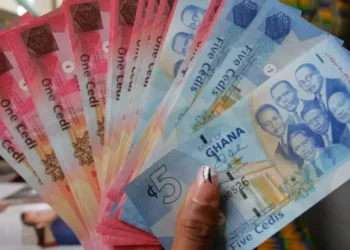Ghana’s recent sovereign credit rating upgrade by S&P Global Ratings from ‘Selective Default’ (SD) to ‘CCC+’ has been widely welcomed by market watchers as a signal of solid macroeconomic progress.
The move comes after the country successfully completed critical phases of its domestic and external debt restructuring while showing early signs of economic stabilization. But what does this rating really mean for Ghana’s financial outlook?
According to Ms. Gifty Annor-Sika Asantewah, President of Women in Forex Ghana, the rating upgrade “is not just a temporary boost—it is a meaningful reflection of Ghana’s policy discipline and determination to regain market credibility.”
In an interview with Vaultz News, Ms. Asantewah explained that the S&P upgrade indicates growing global recognition of Ghana’s macroeconomic adjustments, particularly in the areas of fiscal consolidation, currency stabilization, and reserve accumulation.
“Both the current and former governments have taken bold and sometimes painful steps in recent years—restructuring debt, freezing non-essential expenditure, and tightening monetary policy. What we are seeing now is the first phase of the recovery process, and this rating upgrade is a nod to that effort.”
Ms. Gifty Annor-Sika Asantewah
S&P’s May 9, 2025 report cited successful debt restructuring and an improving external liquidity profile as the primary drivers behind the rating decision. The agency also maintained Ghana’s long- and short-term local currency ratings at ‘CCC+/C’ with a stable outlook.
Cedi Recovery and Inflation Moderation
One of the most visible signs of stabilization, according to Ms. Asantewah, is the strengthening of the Ghanaian cedi. After spiraling beyond GH¢17 per dollar in 2023, the cedi has appreciated and is currently trading around GH¢13.
“This appreciation is not an illusion. It’s the result of tighter foreign exchange control, increasing gold exports under the Gold Board (GOLDBOD), and more disciplined public spending.”
Ms. Gifty Annor-Sika Asantewah
Inflation, which peaked at worrying levels in early 2023, has also slowed significantly to 21.2%—its lowest level in eight months. Ms. Asantewah believes this trend points to improved monetary policy coordination between the Ministry of Finance and the Bank of Ghana.
“Inflation is one of the most persistent threats to household income and investor confidence. Seeing it decline in tandem with a stable exchange rate reinforces the view that the fundamentals are gradually being restored.”
Ms. Gifty Annor-Sika Asantewah
Foreign Reserves and Gold Windfall
Ghana’s increasing gold export earnings have also helped boost foreign reserves and improve balance of payments support. S&P highlighted these developments as a core component of Ghana’s enhanced ability to meet near-term external obligations.
“Export diversification and a windfall from high gold prices have really helped Ghana’s external position. We’re beginning to see the rewards of that, especially in terms of reserve build-up and cedi resilience.”
Ms. Gifty Annor-Sika Asantewah
The Bank of Ghana has reported a gradual uptick in gross international reserves, which have strengthened the country’s import cover and provided a cushion against further exchange rate volatility.
Not Out of the Woods
Despite the positive momentum, Ms. Asantewah urged caution. She acknowledged that while the rating upgrade marks a significant shift in perception, Ghana remains vulnerable to external and domestic shocks.
“S&P’s outlook is stable, but that doesn’t mean risk is off the table. If fiscal performance slips or if we lose access to concessional financing, the gains we’ve made could easily unravel,” she cautioned.
She also noted that high debt service obligations, particularly in the near term, could still place pressure on government finances, making it vital for Ghana to adhere strictly to its IMF-supported economic reform programme.
The successful completion of the Eurobond restructuring in October 2024 and the January 2025 agreement with bilateral creditors have restored a degree of investor trust. However, Ms. Asantewah again warned that continued transparency and predictability in Ghana’s debt management will be essential to avoid renewed market anxiety.
“This upgrade should not make us complacent. Rather, it should motivate government and private sector actors to stay committed to prudent fiscal and financial governance. The market doesn’t just respond to headlines—it responds to consistency.”
Ms. Gifty Annor-Sika Asantewah
As President of Women in Forex Ghana, Ms. Asantewah also highlighted the impact of macroeconomic shifts on small businesses and women-led enterprises.
“Stabilizing the economy has a trickle-down effect. It improves the credit environment, reduces input costs, and allows women entrepreneurs to plan their finances with greater certainty.”
Ms. Gifty Annor-Sika Asantewah
She urged policymakers to pair macro-level reforms with microeconomic support—such as access to credit for SMEs and financial literacy programmes—to ensure that the benefits of economic stabilization reach the grassroots.
Looking forward, Ms. Asantewah emphasized the importance of anchoring policy decisions in data and global best practices, while fostering local resilience and innovation. “This rating upgrade is a milestone, but the journey is still long. What we need now is fiscal discipline, accountability, and a clear strategy to build inclusive growth,” she concluded.
As Ghana gradually reclaims its place on the global financial map, Gifty Annor-Sika Asantewah believes the country is on the right path—but must stay vigilant to keep the momentum going.
READ ALSO: Bloomberg Ranks Cedi as World’s Best-Performing Currency in April 2025


















